Event Search
July 2024
Events for July 11 2024
1 Event Found
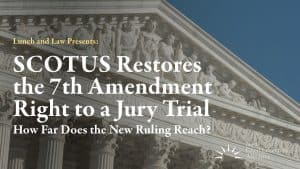
SCOTUS Restores the 7th Amendment Right to a Jury Trial
SEC v. Jarkesy is one of the biggest SCOTUS cases of this term. The Wall Street Journal called it “a blow to regulators that could have ripple effects across the U.S. government.” This decision revives one of the most important liberty protections in the Bill of Rights: the Seventh Amendment right to a jury trial. Its logic applies to all federal agency proceedings, not just those at the SEC. The opinion is a historic declaration of independence from decades of encroachments by the Administrative State.
What will you learn about watching the discussion?
1. The legal strategy that led to the victory. NCLA has supported Mr. Jarkesy’s cause and collaborated with his counsel for many years. Others told them that a Seventh Amendment argument stood no chance. Nevertheless, they prevailed.
2. How the logic of the decision applies to other federal agency proceedings, not just those at the SEC.
3. How Jarkesy meshes with other recent SCOTUS rulings to curtail the runaway Administrative State—Relentless, Corner Post, and others.
Moderator:
NCLA President Mark Chenoweth
Panelists:
Peggy Little, NCLA Senior Litigation Counsel
Richard Samp, Seasoned constitutional appellate litigator and member of the NCLA Board of Advisors
Michael Showalter, Special Counsel, Wiley Rein
June 2024
Events for June 11 2024
1 Event Found
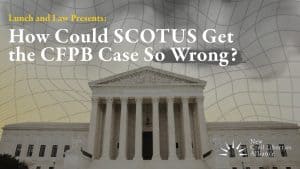
How Could SCOTUS Get the CFPB Case So Wrong?
The Consumer Financial Protection Bureau (CFPB) is funded uniquely and unconstitutionally.
CFPB draws money directly from the earnings of the Federal Reserve System to carry out the bureau’s duties, completely sidestepping Congress’s normal appropriations control.
And yet, in a 7-2 opinion written by Justice Thomas, the Supreme Court in CFPB v. CFSA recently upheld this highly unusual mechanism as constitutional.
In this Lunch and Law series, NCLA President Mark Chenoweth, along with panelists Adam J. White, Executive Director of the C. Boyden Gray Center for the Study of the Administrative State; Richard Samp, seasoned constitutional appellate litigator and member of the NCLA Board of Advisors; and Louis Capozzi, former law clerk to Justice Neil Gorsuch, appellate litigator at Jones Day, and lecturer at UPenn’s Carey School of Law, discuss the implications of the Court’s decision.
Events for June 25 2024
1 Event Found
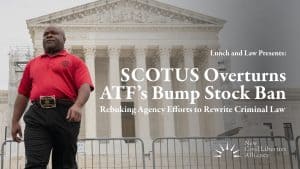
SCOTUS Overturns ATF’s Bump Stock Ban, Agency Cannot Rewrite Criminal Law
The Cargill case is a big victory, described by David Lat in Original Jurisdiction as one of the biggest Supreme Court cases of the term. This important decision checks the Administrative State: an agency may not regulate beyond its statutory authorization. Agency overreach is a recurring problem that needs a systemic solution. If agencies like ATF suffer no penalty for overstepping their statutory authority, they will keep doing it repeatedly.
What will you learn about watching the discussion?
1. NCLA’s legal arguments that led the Court to rule in favor of NCLA’s stance that the ATF’s bump-stock ban conflicts with the federal statute defining “machine guns.”
2. The details of the Supreme Court’s decision and how it reaffirms Congress as the sole author of criminal laws.
3. How this decision will influence future rulings aimed at curbing the runaway Administrative State.
Moderator:
NCLA President Mark Chenoweth
Panelists:
Rich Samp, Seasoned constitutional appellate litigator and member of the NCLA Board of Advisors
John Ohlendorf, Partner, Cooper & Kirk
April 2024
Events for April 24 2024
1 Event Found
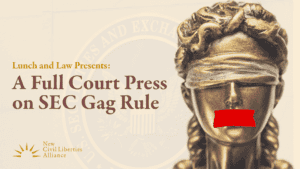
A Full Court Press on the SEC Gag Rule
When the SEC charges Americans, it issues inflammatory press releases setting out a litany of misdeeds and fraud. While these are just allegations, these alarming releases instantly destroy lives, reputations and future occupations. Imagine that these charges are untrue or that the government cannot carry its burden on what prove to be novel and untested theories of liability unheard of at law. BUT, a successful defense will cost you millions and many years of your life—against an agency that can outlast and outspend you.
Faced with this prospect of spending millions in defense of a protracted proceeding with the cards stacked against you, you throw the towel in and settle—only to learn that SEC imposes a gag that forbids you from ever contradicting the government’s theory or allegations against you—for life! No judge or jury has ever considered the facts of your case. This gag is not something the SEC could ever win at trial. But, to all the world, your reputation will forever be tarnished. You lose your family, your friends, your job, and are already on the verge of financial ruin. The SEC’s press releases remain the only and final word about you. But that could never happen in America, where we have the First Amendment, right? Where the Supreme Court has long guaranteed unabridged free speech rights to even convicted felons?
This is the unconstitutional nightmare of the SEC Gag Rule. The SEC—an agency outlier—has been charging Americans for fifty years knowing that their lawless rule means those charges can never be publicly denied.
NCLA has recently taken the SEC to court on behalf of nine courageous gagged individuals from across the country and two press organizations represented by NCLA to challenge whether this is remotely constitutional. Each one of these individuals has a compelling story to tell.
Senior NCLA Litigator Peggy Little moderates a panel featuring NCLA clients Thomas Powell and Cassandra Toroian who want to tell their stories and Christopher Rausch of the Cape Gazette of Delaware who wants to publish those accounts telling both sides of the story of an SEC settlement. Just like the First Amendment guarantees.
March 2024
Events for March 19 2024
1 Event Found
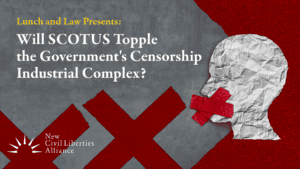
Will SCOTUS Topple the Government's Censorship Industrial Complex?
In this Lunch and Law series, we discuss Murthy v. Missouri, NCLA’s most recent Supreme Court case, about the government’s use of social media companies to execute a massive censorship regime. Using a system of coercion and influence, several agencies in the executive branch—including the White House, the CDC, the Surgeon General’s Office, the FBI, CISA, and more—violated the First Amendment rights of thousands of Americans, including NCLA’s clients, for the so-called crime of making true statements that were inconvenient to the government’s narrative.
This event took place 24 hours after oral argument before the Supreme Court and the discussion was led by NCLA President Mark Chenoweth. Joining him on the panel is NCLA client Dr. Aaron Kheriaty, Fellow and Director, Bioethics and American Democracy Program, Ethics and Public Policy Center as well as NCLA Litigation Counsel Jenin Younes, who fought on behalf of our clients to push this case all the way to the Supreme Court.
February 2024
Events for January 29 2024
1 Event Found
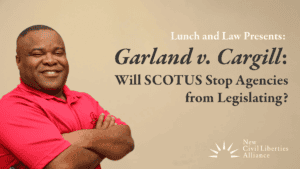
Garland v. Cargill: Will SCOTUS Stop Agencies from Legislating?
In this Lunch and Law series, we discuss the so-called “Bumpstock Ban” and the historic Supreme Court case, Garland v. Cargill, that will decide whether the ATF had the power to enact legislation when Congress had considered such legislation and chosen not to do so.
This Lunch and Law was held the day after NCLA represented Michael Cargill in oral argument before the Supreme Court. The panel includes Rich Samp, Senior Litigation Counsel, and lead NCLA attorney on the case, as well as Jonathan Mitchell, an accomplished constitutional appellate litigator who manned the podium at oral argument, and our client Michael Cargill.
Events for February 29 2024
1 Event Found

Garland v. Cargill: Will SCOTUS Stop Agencies from Legislating?
In this Lunch and Law series, we discuss the so-called “Bumpstock Ban” and the historic Supreme Court case, Garland v. Cargill, that will decide whether the ATF had the power to enact legislation when Congress had considered such legislation and chosen not to do so.
This Lunch and Law was held the day after NCLA represented Michael Cargill in oral argument before the Supreme Court. The panel includes Rich Samp, Senior Litigation Counsel, and lead NCLA attorney on the case, as well as Jonathan Mitchell, an accomplished constitutional appellate litigator who manned the podium at oral argument, and our client Michael Cargill.
January 2024
Events for January 24 2024
1 Event Found
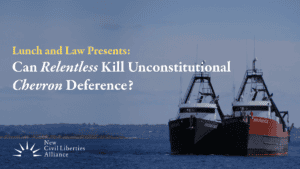
Can Relentless & Loper Bright Kill Unconstitutional Chevron Deference?
Chevron Deference purports to require Article III judges to violate their oath of impartiality by yielding to an administrative agency’s interpretation of the law. Basically, the judge is forced to rule for the government, even if that judge thinks their interpretation of the law is wrong. And that’s exactly what happened in the Relentless and Loper Bright cases. But NCLA and its allies have challenged this unconstitutional thumb on the scales of justice in favor of the government, and the Supreme Court is set to resolve the issue this term.
This event took place just days after oral argument before the Supreme Court. What happened? How did it go? Will SCOTUS finally kill Chevron Deference completely, or only limit its effect?
Join our panel of expert appellate litigators who argued these cases in court to find out.
December 2023
October 2023
Events for October 18 2023
1 Event Found
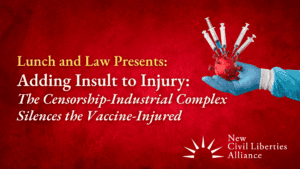
The Censorship-Industrial Complex Silences the Vaccine-Injured
NCLA leads the charge against the massive censorship industrial complex that found the federal government coercing social media companies into trampling the First Amendment rights of anyone whose speech it felt was inconvenient. First, in the case of Missouri v. Biden, and now in Dressen v. Flaherty, the New Civil Liberties Alliance has uncovered a deluge of evidence that the government has been engaged in unconstitutional censorship of Americans who just want to be able to tell the truth.
For NCLA clients Brianne Dressen and Nikki Holland, that truth is a difficult one about vaccine injuries. NCLA President Mark Chenoweth moderates a discussion with NCLA Litigation Counsel Casey Norman and these brave Americans who were not allowed to speak freely about the vaccine injuries suffered by them and their loved ones.
September 2023
Events for September 20 2023
1 Event Found
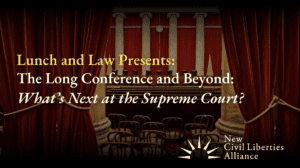
The Long Conference & Beyond: What’s Next at the Supreme Court
NCLA leads the charge against the massiOur panel of expert appellate litigators discuss a few upcoming Supreme Court cases, as well as several where cert is still pending, each with profound implications on the lawless and unaccountable Administrative State.
NCLA President and General Counsel Mark Chenoweth moderates a panel of experienced appellate litigators, including NCLA Senior Litigation Counsel Russ Ryan, Rich Samp, and John Vecchione. The panel will preview CFPB v. CFSA, Loper Bright Enterprises v. Raimondo, and SEC v. Jarkesy, as well as several other cases that could be granted at the Long Conference or shortly thereafter (e.g., Cargill v. Garland, Lemelson v. SEC, and Murphy, Murphy, and Gounaud v. SEC).
July 2023
Events for June 26 2023
1 Event Found
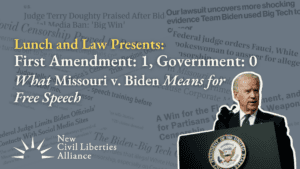
What Missouri v. Biden Means for Free Speech
Join NCLA for a timely discussion of the dramatic July 4 injunction handed down by Judge Terry Doughty of the U.S. District Court for the Western District of Louisiana. The injunction comes in the case of Missouri v. Biden, a lawsuit brought by NCLA along with Missouri and Louisiana against a vast array of federal agencies for their invidious efforts to censor the free expression of Americans on social media. The facts we uncovered are incredible: a massive censorship enterprise of unparalleled scope coming from scores of bureaucrats and agencies throughout the Administrative State, all designed to crush dissent and stifle any ideas (even true statements) the government found inconvenient.
NCLA Senior Litigator John Vecchione moderates the discussion between Zhonette Brown, who have litigated this case on behalf of the individual clients represented by NCLA, and John Sauer, Principal at James Otis Law Group, LLC, originally represented Missouri in the case as the state’s Solicitor General, and now represents Louisiana. He previously also served as Deputy Attorney General for Special Litigation for Missouri.
Events for July 13 2023
1 Event Found
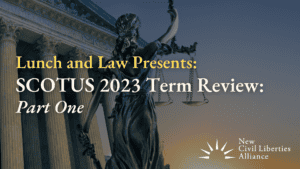
SCOTUS 2023 Term Review
Our panel discusses some of the decisions from what has turned out to be the most epic term since…well, last term!
Hear from a variety of experts, including: NCLA President and General Counsel Mark Chenoweth; Senior Litigation Counsel Peggy Little, fresh off a 9-0 victory in SEC v. Cochran (consolidated with Axon v. FTC): Litigation Counsel Sheng Li, leading NCLA’s charge against the unlawful student loans struck down by the Court in Biden v. Nebraska; and others.
Events for July 26 2023
1 Event Found

What Missouri v. Biden Means for Free Speech
Join NCLA for a timely discussion of the dramatic July 4 injunction handed down by Judge Terry Doughty of the U.S. District Court for the Western District of Louisiana. The injunction comes in the case of Missouri v. Biden, a lawsuit brought by NCLA along with Missouri and Louisiana against a vast array of federal agencies for their invidious efforts to censor the free expression of Americans on social media. The facts we uncovered are incredible: a massive censorship enterprise of unparalleled scope coming from scores of bureaucrats and agencies throughout the Administrative State, all designed to crush dissent and stifle any ideas (even true statements) the government found inconvenient.
NCLA Senior Litigator John Vecchione moderates the discussion between Zhonette Brown, who have litigated this case on behalf of the individual clients represented by NCLA, and John Sauer, Principal at James Otis Law Group, LLC, originally represented Missouri in the case as the state’s Solicitor General, and now represents Louisiana. He previously also served as Deputy Attorney General for Special Litigation for Missouri.
June 2023
April 2023
Events for March 27 2023
1 Event Found
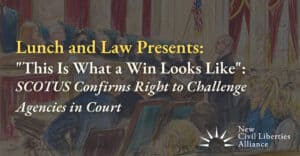
SCOTUS Confirms Right to Challenge Agencies in Court
After seven years of an uphill battle challenging the adjudicatory process at the Securities and Exchange Commission, Michelle Cochran’s backbreaking journey has paid off. In a historic and unanimous Supreme Court victory in Axon v. FTC consolidated with SEC v. Cochran, the highest court in the land declared earlier this month that Michelle can, indeed, challenge the constitutionality of the agency’s adjudicatory process (and even the constitutionality of the agency itself) before undergoing yet another administrative adjudication.
As Justice Gorsuch remarked after describing the long and painful path taken by NCLA’s client to get to this point: “This is what a win looks like.” But now what
NCLA President and General Counsel Mark Chenoweth moderates a discussion with our expert panelists: Greg Garre, partner at Latham & Watkins, and Peggy Little, Senior Litigation Counsel at NCLA, to answer that very question.
Events for April 27 2023
1 Event Found

SCOTUS Confirms Right to Challenge Agencies in Court
After seven years of an uphill battle challenging the adjudicatory process at the Securities and Exchange Commission, Michelle Cochran’s backbreaking journey has paid off. In a historic and unanimous Supreme Court victory in Axon v. FTC consolidated with SEC v. Cochran, the highest court in the land declared earlier this month that Michelle can, indeed, challenge the constitutionality of the agency’s adjudicatory process (and even the constitutionality of the agency itself) before undergoing yet another administrative adjudication.
As Justice Gorsuch remarked after describing the long and painful path taken by NCLA’s client to get to this point: “This is what a win looks like.” But now what
NCLA President and General Counsel Mark Chenoweth moderates a discussion with our expert panelists: Greg Garre, partner at Latham & Watkins, and Peggy Little, Senior Litigation Counsel at NCLA, to answer that very question.
March 2023
Events for March 29 2023
1 Event Found
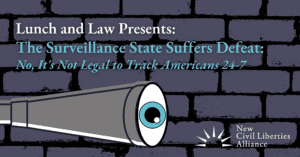
The Surveillance State Suffers Defeat
Just because you work in a regulated industry doesn’t mean the government can watch you all the time. NCLA successfully challenged an unlawful and unconstitutional regulation by the National Marine Fisheries Service (NMFS), which required 24-hour GPS tracking of recreational charter boat fishing vessels and reporting of confidential economic data.
Essentially, this federal agency was forcing all charter boat captains to wear ankle monitors like convicted criminals, despite not having done anything wrong! Thankfully, the Fifth Circuit Court of Appeals ruled that NMFS violated the Administrative Procedure Act and, likely, the Fourth Amendment. But is the case over? Will NMFS simply reissue a substantively similar surveillance rule? How can we stop the federal government from spying on us with a massive regime of suspicion-less administrative search?
NCLA Senior Litigation Counsel John Vecchione moderates a panel discussion with Greg Grimsal, member of GAMB (Gordon Arata Montgomery Barnett), and Robert Alt, President and CEO of The Buckeye Institute, who submitted an amicus brief in support of the successful challenge.
December 2022
Events for December 13 2022
1 Event Found
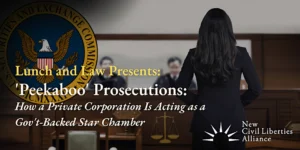
'Peekaboo' Prosecutions: How a Private Corporation Is Acting as a Govt-Backed Star Chamber
Imagine a world where Congress empowers a private corporation to secretly investigate and punish members of a particular industry. Enter the Public Company Accounting Oversight Board (PCAOB) — often derided as “peekaboo” due to its acronym and infamous secrecy. This private version of the Securities and Exchange Commission receives funding that never requires an appropriation from Congress and employs personnel who are exempt from laws designed to keep regulators in check.
This private regulator’s activity is secretly performed by staff employees with no meaningful supervision by any president-appointed government official. There is no jury and no multi-member hearing panel that includes your industry peers.
NCLA Senior Litigation Associate Russ Ryan will moderate a panel of distinguished experts to discuss the myriad problems posed by such an obviously unconstitutional private enforcement mechanism, as well as what must be done to restore our fundamental civil liberties.
About our Panel
Mike Carvin, a partner at Jones Day, is one of the leading appellate and trial lawyers challenging state and federal regulations on constitutional and statutory grounds, with 11 Supreme Court arguments and numerous high-profile victories, including Free Enterprise Fund v. PCAOB, in which the Supreme Court that held the PCAOB unconstitutional on account of the board members being improperly insulated from Presidential removal authority.
Andrew Vollmer, a senior affiliated scholar at the Mercatus Center, was the deputy general counsel at the Securities and Exchange Commission from 2006 to early 2009 as well as serving for many years as a partner in the securities litigation and enforcement practice of Wilmer Cutler Pickering Hale and Dorr LLP.
November 2022
September 2022
Events for August 29 2022
1 Event Found
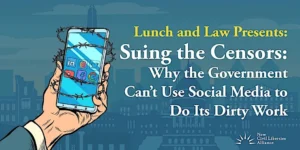
Why the Govt Can't Use Social Media to Do Its Dirty Work
NCLA joined the Missouri and Louisiana attorneys general in suing President Biden, Anthony Fauci, and HHS for their role in government-sponsored censorship. Discovery in State of Missouri ex rel. Schmitt, et al. v. Biden, et al. revealed just how much of Big Tech censorship is compelled or coerced by government actors behind the scenes—from the FBI to the White House, including public health autocrats like Fauci. This collusion between private companies and the government rises to the level of state action and poses a danger to free speech and the future of scientific inquiry.
NCLA Senior Litigation Counsel John Vecchione moderates a panel discussion with Jenin Younes, Litigation Counsel, who has led NCLA’s high-impact cases against government abuse during the pandemic; Mark Changizi, cognitive theoretical scientist and NCLA client, whose Twitter account was censored at the behest of bureaucrats at HHS; and Jill Hines, Co-Director of Health Freedom Louisiana, whose two social media accounts have experienced extensive censorship due to her Covid-19 viewpoints.
Events for September 29 2022
1 Event Found

Why the Govt Can't Use Social Media to Do Its Dirty Work
NCLA joined the Missouri and Louisiana attorneys general in suing President Biden, Anthony Fauci, and HHS for their role in government-sponsored censorship. Discovery in State of Missouri ex rel. Schmitt, et al. v. Biden, et al. revealed just how much of Big Tech censorship is compelled or coerced by government actors behind the scenes—from the FBI to the White House, including public health autocrats like Fauci. This collusion between private companies and the government rises to the level of state action and poses a danger to free speech and the future of scientific inquiry.
NCLA Senior Litigation Counsel John Vecchione moderates a panel discussion with Jenin Younes, Litigation Counsel, who has led NCLA’s high-impact cases against government abuse during the pandemic; Mark Changizi, cognitive theoretical scientist and NCLA client, whose Twitter account was censored at the behest of bureaucrats at HHS; and Jill Hines, Co-Director of Health Freedom Louisiana, whose two social media accounts have experienced extensive censorship due to her Covid-19 viewpoints.
August 2022
Events for August 10 2022
1 Event Found
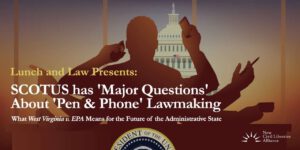
SCOTUS Has 'Major Questions' About 'Pen & Phone' Lawmaking
In a blockbuster 6-3 decision on June 30, the U.S. Supreme Court rejected the Environmental Protection Agency’s claim of sweeping regulatory authority under the Clean Air Act in the case West Virginia v. Environmental Protection Agency. Invoking the “major questions doctrine,” the high court stated that EPA could not “point to ‘clear congressional authorization’” to devise carbon emissions limits that would shut down many power plants and reconfigure the entire industry.
NCLA President and General Counsel Mark Chenoweth moderates the discussion with NCLA Senior Litigation Counsel Rich Samp, who co-authored NCLA’s amicus brief, and Jonathan Brightbill, of Winston & Strawn, who helped draft the repeal of the Obama-era rule at issue and then argued that portion of the case in the DC Circuit.
Learn what we can do to stop the greatest threat to civil liberties—the Administrative State.
July 2022
Events for June 27 2022
1 Event Found
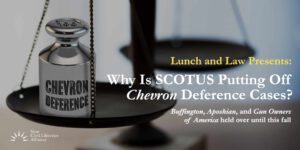
Why Is SCOTUS Putting Off Chevron Deference Cases?
Despite making SCOTUSblog’s “Petitions We’re Watching” on multiple occasions this term, the U.S. Supreme Court failed to act on three different cert petitions in which NCLA asks to reconsider Chevron deference.
Our expert panelists, NCLA Senior Litigation Counsel Rich Samp and renowned appellate litigators Roman Martinez from Latham & Watkins and John Tienken from Cooper & Kirk, discuss the curious fate of Chevron deference pending these three cert petitions.
Learn what we can do to stop the greatest threat to civil liberties—the Administrative State.
Events for July 27 2022
1 Event Found

Why Is SCOTUS Putting Off Chevron Deference Cases?
Despite making SCOTUSblog’s “Petitions We’re Watching” on multiple occasions this term, the U.S. Supreme Court failed to act on three different cert petitions in which NCLA asks to reconsider Chevron deference.
Our expert panelists, NCLA Senior Litigation Counsel Rich Samp and renowned appellate litigators Roman Martinez from Latham & Watkins and John Tienken from Cooper & Kirk, discuss the curious fate of Chevron deference pending these three cert petitions.
Learn what we can do to stop the greatest threat to civil liberties—the Administrative State.
March 2022
Events for March 30 2022
1 Event Found
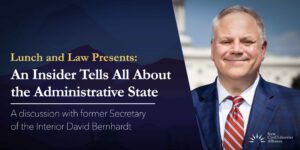
An Insider Tells All About the Administrative State
NCLA Senior Litigation Counsel Harriet Hageman sits down with former Secretary of the Interior David Bernhardt to discuss the many ways that powerful federal and state agencies ignore the Constitution and violate our civil liberties.
He reveals how runaway regulators routinely end-run the Administrative Procedure Act using their favorite tools—judicial deference, guidance, and intentional ambiguity—to perpetuate a one-way ratchet leading to more and more abusive regulation.
Learn what we can do to stop the greatest threat to civil liberties—the Administrative State.
January 2022
Events for December 26 2021
1 Event Found
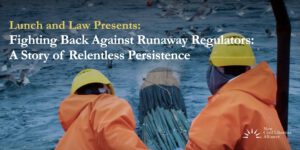
Fighting Back Against Runaway Regulators: A Story of Relentless Persistence
Industry regulating agencies could be impacting your next seafood feast!
The Department of Commerce and the National Oceanic and Atmospheric Administration are forcing Atlantic herring fishermen to fund government-mandated monitors at sea.
NCLA Senior Litigation Counsel John Vecchione moderates the discussion about the rule being challenged by NCLA in Relentless Inc., et al. v. U.S. Dept. of Commerce, et al., with Meghan Lapp, Fisheries Liaison & General Manager for our client, Seafreeze, Ltd.
NCLA represents small businesses of high-capacity freezer trawlers incorporated in Rhode Island and Massachusetts that have commercially fished Atlantic herring as well as Loligo and Illex squids, butterfish, and Atlantic Mackerel for more than thirty years.
The rule penalizes NCLA’s clients unfairly by making them pay for herring monitors even when fishing for other catches. It can cost anywhere from $750 to $850 a day to have onboard monitoring people. If this program is implemented, the fishermen won’t be making any money.
They’ll be fishing for nothing. The at-sea monitor mandate is unlawfully “industry-funded.” These agencies do not have statutory authority from Congress to order additional industry funding for a program that the agencies think is underfunded, but they have issued a rule that threatens the livelihoods of fishermen regardless.
Events for January 26 2022
1 Event Found

Fighting Back Against Runaway Regulators: A Story of Relentless Persistence
Industry regulating agencies could be impacting your next seafood feast!
The Department of Commerce and the National Oceanic and Atmospheric Administration are forcing Atlantic herring fishermen to fund government-mandated monitors at sea.
NCLA Senior Litigation Counsel John Vecchione moderates the discussion about the rule being challenged by NCLA in Relentless Inc., et al. v. U.S. Dept. of Commerce, et al., with Meghan Lapp, Fisheries Liaison & General Manager for our client, Seafreeze, Ltd.
NCLA represents small businesses of high-capacity freezer trawlers incorporated in Rhode Island and Massachusetts that have commercially fished Atlantic herring as well as Loligo and Illex squids, butterfish, and Atlantic Mackerel for more than thirty years.
The rule penalizes NCLA’s clients unfairly by making them pay for herring monitors even when fishing for other catches. It can cost anywhere from $750 to $850 a day to have onboard monitoring people. If this program is implemented, the fishermen won’t be making any money.
They’ll be fishing for nothing. The at-sea monitor mandate is unlawfully “industry-funded.” These agencies do not have statutory authority from Congress to order additional industry funding for a program that the agencies think is underfunded, but they have issued a rule that threatens the livelihoods of fishermen regardless.
November 2021
Events for November 30 2021
1 Event Found

When NASDAQ Attacks! The Problem with Mandated Diversity Quotas for Corporate Boards
The Securities and Exchange Commission is at it again! This time, the Nasdaq Stock Market serves as the instrument of oppression.
SEC is setting race and gender quotas for the composition of corporate boards and providing a list of Nasdaq-approved candidates to fill those quotas.
Sheng Li, NCLA Litigation Counsel, will moderate a panel with Jonathan Berry, a Partner at Boyden Gray and Associates, Scott Shepard, Director of the Free Enterprise Project at the National Center for Public Policy Research, and Peggy Little, NCLA Senior Litigation Counsel, to discuss legal challenges brought by NCLA and its allies against the Nasdaq diversity quotas.
September 2021
Events for August 29 2021
1 Event Found
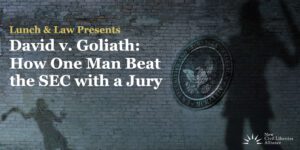
David v. Goliath: How One Man Beat the SEC with a Jury
His name is David Lopez and he won his case against one of the Goliaths of the Administrative State—the U.S. Securities and Exchange Commission. Just like in the biblical story of David and Goliath, David Lopez overcame incredible odds to topple a malicious giant.
When the SEC decides you’ve done something wrong, they use the full power of the Administrative State to destroy you. They attack your business and scare your customers, leaving you under an investigative cloud and subjecting you to onerous discovery demands, often for three or four years before they ever file any charges. Many victims of this harassment simply do not have the ability to fight back against an agency with seemingly unlimited resources.
The SEC knows this.
Indeed, they count on it and use just the threat of enforcement as a way to subtly change the law. And that’s what they expected when they came after David Lopez and the other defendants in SEC v. Spartan Securities Group with a radical reading of the law.
Not this time! Armed with a jury and NCLA attorneys, David was able to beat this Goliath!
Events for September 29 2021
1 Event Found

David v. Goliath: How One Man Beat the SEC with a Jury
His name is David Lopez and he won his case against one of the Goliaths of the Administrative State—the U.S. Securities and Exchange Commission. Just like in the biblical story of David and Goliath, David Lopez overcame incredible odds to topple a malicious giant.
When the SEC decides you’ve done something wrong, they use the full power of the Administrative State to destroy you. They attack your business and scare your customers, leaving you under an investigative cloud and subjecting you to onerous discovery demands, often for three or four years before they ever file any charges. Many victims of this harassment simply do not have the ability to fight back against an agency with seemingly unlimited resources.
The SEC knows this.
Indeed, they count on it and use just the threat of enforcement as a way to subtly change the law. And that’s what they expected when they came after David Lopez and the other defendants in SEC v. Spartan Securities Group with a radical reading of the law.
Not this time! Armed with a jury and NCLA attorneys, David was able to beat this Goliath!
August 2021
Events for August 25 2021
1 Event Found
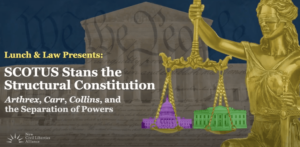
SCOTUS Stans the Structural Constitution: Arthrex, Carr, Collins, and the Separation of Powers
NCLA Senior Litigation Counsel Rich Samp moderates a discussion with Jared McClain, NCLA Litigation Counsel, and Russ Ryan, a Partner in King & Spalding’s Special Matters and Government Investigations practice, regarding the Separation of Powers in the context of recent Supreme Court decisions in U.S. v. Arthrex, Carr v. Saul, and Collins v. Yellen.
July 2021
Events for June 28 2021
1 Event Found
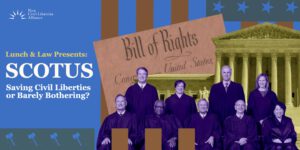
SCOTUS: Saving Civil Liberties or Barely Bothering?
Mark Chenoweth, NCLA Executive Director and General Counsel, moderates a discussion with Richard Samp, NCLA Senior Litigation Counsel, and Nick Reaves, Becket Fund’s Litigation Counsel, who was part of the legal team that secured a unanimous victory in Fulton v. City of Philadelphia.
They address the term that just concluded at the U.S. Supreme Court in which NCLA had a perfect record of amicus wins against administrative abuse of power. The Justices seemingly took steps to preserve our most basic freedoms from abusive predation by the too-powerful Administrative State, but did the Court do enough?
In Fulton v. City of Philadelphia, the Court defended the free exercise clause of the First Amendment from an agency targeting Catholic Social Services, but it stopped short of overturning Employment Division v. Smith.
In Americans for Prosperity v. Bonta, the Supreme Court again defended the First Amendment, and this time it was the freedom of association under attack by the government. But rather than call out any such dragnet information-collection regimes, the Court seemed to suggest other schemes might pass constitutional muster.
In AMG Capital Management, LLC v. Federal Trade Commission, the Court unanimously ruled that when a statute says an agency may seek a “permanent injunction” that does not give the agency free rein to collect monetary damages, restitution, or disgorgement of funds. A victory to be sure, but FTC already seems to be dodging the impact of the ruling.
Events for July 28 2021
1 Event Found

SCOTUS: Saving Civil Liberties or Barely Bothering?
Mark Chenoweth, NCLA Executive Director and General Counsel, moderates a discussion with Richard Samp, NCLA Senior Litigation Counsel, and Nick Reaves, Becket Fund’s Litigation Counsel, who was part of the legal team that secured a unanimous victory in Fulton v. City of Philadelphia.
They address the term that just concluded at the U.S. Supreme Court in which NCLA had a perfect record of amicus wins against administrative abuse of power. The Justices seemingly took steps to preserve our most basic freedoms from abusive predation by the too-powerful Administrative State, but did the Court do enough?
In Fulton v. City of Philadelphia, the Court defended the free exercise clause of the First Amendment from an agency targeting Catholic Social Services, but it stopped short of overturning Employment Division v. Smith.
In Americans for Prosperity v. Bonta, the Supreme Court again defended the First Amendment, and this time it was the freedom of association under attack by the government. But rather than call out any such dragnet information-collection regimes, the Court seemed to suggest other schemes might pass constitutional muster.
In AMG Capital Management, LLC v. Federal Trade Commission, the Court unanimously ruled that when a statute says an agency may seek a “permanent injunction” that does not give the agency free rein to collect monetary damages, restitution, or disgorgement of funds. A victory to be sure, but FTC already seems to be dodging the impact of the ruling.
June 2021
Events for May 30 2021
1 Event Found
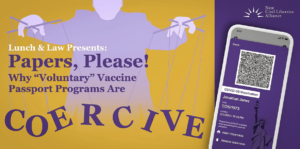
Papers, Please! Why "Voluntary" Vaccine Passport Programs Are Coercive
May the government lawfully compel citizens to take a new, experimental vaccine? And does New York’s vaccine passport program, which purports to be voluntary, constitute government compulsion?
We touch on the legality of vaccine passports, public health, privacy, and the economic implications of such programs, as well as the variety of legitimate reasons a citizen might have for rejecting this attempt at government-sponsored coercion in our latest Lunch and Law speaker series.
Jenin is joined by Dr. Jay Bhattacharya, epidemiologist and professor of medicine at Stanford University, and director of Stanford’s Center for Demography and Economics of Health and Aging; Phil Magness, Director of Research & Education at the American Institute for Economic Research; Naomi Wolf, journalist and author of the book “The Beauty Myth”; and Adam Creighton, former economics editor and current Washington correspondent for The Australian.
Events for June 30 2021
1 Event Found

Papers, Please! Why "Voluntary" Vaccine Passport Programs Are Coercive
May the government lawfully compel citizens to take a new, experimental vaccine? And does New York’s vaccine passport program, which purports to be voluntary, constitute government compulsion?
We touch on the legality of vaccine passports, public health, privacy, and the economic implications of such programs, as well as the variety of legitimate reasons a citizen might have for rejecting this attempt at government-sponsored coercion in our latest Lunch and Law speaker series.
Jenin is joined by Dr. Jay Bhattacharya, epidemiologist and professor of medicine at Stanford University, and director of Stanford’s Center for Demography and Economics of Health and Aging; Phil Magness, Director of Research & Education at the American Institute for Economic Research; Naomi Wolf, journalist and author of the book “The Beauty Myth”; and Adam Creighton, former economics editor and current Washington correspondent for The Australian.
May 2021
Events for April 26 2021
1 Event Found
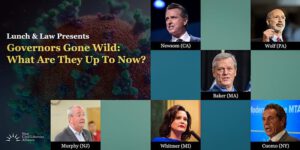
Governors Gone Wild: What Are They Up To Now?
NCLA Executive Director Mark Chenoweth led a raucous roundtable discussion with NCLA litigators regarding the continued violation of our constitutional rights by governors in response to the COVID-19 pandemic. We also announced the state winner of our King George III Prize calling out the worst abuser of civil liberties in 2020!
We first addressed the issue last June, now we’re checking back in with NCLA litigators Harriet Hageman, Michael DeGrandis, Jared McClain, Caleb Kruckenberg, and Jenin Younes, who are hard at work taking legal action against governors and governments who have overstepped statutory authority, especially during the pandemic.
Despite the increasingly good news about the rate of infection and the unprecedented speed of vaccine deployment, many federal, state and local governments stubbornly refuse to let go of their stranglehold on our most precious civil liberties. NCLA continues to work overtime to restore the constitutional guardrails on the Administrative State’s pandemic response, and we‘ve had some victories in our fight to save civil liberties from power-mad governors we’d like to share. But there’s still lots of work yet to be done.
Events for May 26 2021
1 Event Found

Governors Gone Wild: What Are They Up To Now?
NCLA Executive Director Mark Chenoweth led a raucous roundtable discussion with NCLA litigators regarding the continued violation of our constitutional rights by governors in response to the COVID-19 pandemic. We also announced the state winner of our King George III Prize calling out the worst abuser of civil liberties in 2020!
We first addressed the issue last June, now we’re checking back in with NCLA litigators Harriet Hageman, Michael DeGrandis, Jared McClain, Caleb Kruckenberg, and Jenin Younes, who are hard at work taking legal action against governors and governments who have overstepped statutory authority, especially during the pandemic.
Despite the increasingly good news about the rate of infection and the unprecedented speed of vaccine deployment, many federal, state and local governments stubbornly refuse to let go of their stranglehold on our most precious civil liberties. NCLA continues to work overtime to restore the constitutional guardrails on the Administrative State’s pandemic response, and we‘ve had some victories in our fight to save civil liberties from power-mad governors we’d like to share. But there’s still lots of work yet to be done.
April 2021
Events for April 14 2021
1 Event Found
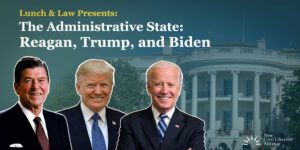
The Administrative State: Reagan, Trump, and Biden
This April, NCLA’s Lunch and Law panel speaker series featured special guest Deputy Director William Perry Pendley. From his time as Deputy Assistant Secretary for Energy and Minerals under former President Ronald Reagan, to his elevation to Deputy Director of the Bureau of Land Management Policy and Programs by former President Donald Trump in 2019, Mr. Pendley has seen and done it all.
Deputy Director Pendley sat down with NCLA’s own Harriet Hageman to discuss how things have changed since his days in the Reagan Administration, what it was like to serve under former President Trump, and his ideas for how we might fight against the Biden Administration’s regulatory overreach.
March 2021
Events for March 30 2021
1 Event Found
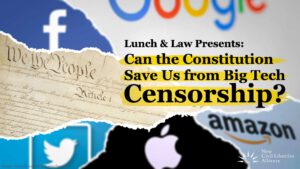
Can the Constitution Save Us from Big Tech Censorship?
Special guests Eugene Volokh, the Gary T. Schwartz Distinguished Professor of Law at UCLA, and Philip Hamburger, the Maurice and Hilda Friedman Professor of Law at the Columbia University School of Law and President of the New Civil Liberties Alliance, engaged in a spirited discussion of what limits, if any, the Constitution places on Section 230 of the Communications Decency Act. The discussion was moderated by Commissioner Brendan Carr, commissioner of the Federal Communications Commission.
About our guest moderator:
Commissioner Brendan Carr is the senior Republican on the Federal Communications Commission, and he served previously as the agency’s General Counsel. Described by Axios as “the FCC’s 5G crusader,” Carr has led the FCC’s work to modernize its infrastructure rules and accelerate the buildout of high-speed networks. His reforms cut billions of dollars in red tape, enabled the private sector to construct high-speed networks in communities across the country, and extended America’s global leadership in 5G.
About our panelists:
Professor Eugene Volokh is a leading American legal scholar known for his scholarship in American constitutional law and libertarianism. Prof. Volokh teaches First Amendment law and a First Amendment amicus brief clinic at UCLA School of Law, where he has also often taught copyright law, criminal law, tort law, and a seminar on firearms regulation policy. Before coming to UCLA, he clerked for Justice Sandra Day O’Connor on the U.S. Supreme Court and for Judge Alex Kozinski on the U.S. Court of Appeals for the Ninth Circuit. Volokh is the author of the textbooks The First Amendment and Related Statutes (7th ed. 2020), and Academic Legal Writing (5th ed. 2013), as well as over 90 law review articles. In his recent article, “Might Federal Preemption of Speech-Protective State Laws Violate the First Amendment?,” published in his prominent legal blog, The Volokh Conspiracy, Prof. Volokh addresses whether it is proper for federal laws to enable such censorship when the states have already taken a stand against it.
Professor Philip Hamburger is one of the preeminent scholars writing today on constitutional law and its history. Prof. Hamburger teaches and writes on wide-ranging topics, including religious liberty, freedom of speech and the press, academic censorship, the regulation of science, judicial duty, administrative power, and the development of liberal thought. In two recent books—Is Administrative Law Unlawful? and The Administrative Threat—he argues that the Administrative State is unconstitutional and a threat to civil liberties. In his latest book, Liberal Suppression: Section 501(c)(3) and the Taxation of Speech, he shows that the revenue code’s restrictions on the political speech of churches are unconstitutional. In his recent article, “The Constitution Can Crack Section 230,” Prof. Hamburger challenges the government’s ability to circumvent the First Amendment by privatizing censorship.
February 2021
January 2021
Events for December 29 2020
1 Event Found
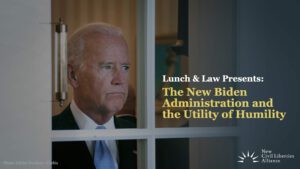
The New Biden Administration and the Utility of Humility
NCLA Litigation Counsel Kara Rollins and Director of the George Washington University Regulatory Studies Center Susan Dudley, address the process of regulating through executive orders and the various ways in which the new Biden administration could undo Trump administration regulations reversing the course of deregulatory efforts over the last four years.
Events for January 29 2021
1 Event Found

The New Biden Administration and the Utility of Humility
NCLA Litigation Counsel Kara Rollins and Director of the George Washington University Regulatory Studies Center Susan Dudley, address the process of regulating through executive orders and the various ways in which the new Biden administration could undo Trump administration regulations reversing the course of deregulatory efforts over the last four years.
October 2020
Events for October 16 2020
1 Event Found
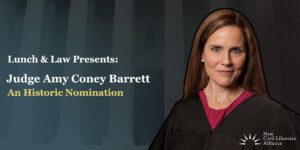
Judge Amy Coney Barrett: An Historic Nomination
NCLA’s Litigation Counsel Adi Dynar and NCLA Senior Litigation Counsel Peggy Little join featured guest panelist, Renee Knake Jefferson.
Ms. Jefferson co-authored Shortlisted: Women in the Shadows of the Supreme Court with Hannah Brenner Johnson. The book tells the overlooked stories of nine extraordinary women who appeared on presidential lists during the 1930s and onward. Her insight into the nomination and upcoming confirmation of Judge Barrett to the U.S. Supreme Court will help shed light on the practical realities of confirming the fifth female Associate Justice of the United States.
Ms. Little, who reviewed Judge Barrett’s written work in detail, provides insight into the cases Judge Barrett has decided as a judge on the United States Court of Appeals for the Seventh Circuit.
July 2020
Events for July 16 2020
1 Event Found
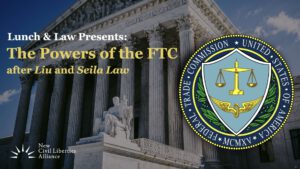
The Powers of the FTC after Liu and Seila Law
In this virtual edition of NCLA Lunch & Law, Senior Litigation Attorney John Vecchione moderates a discussion with featured guest Cynthia Fleming Crawford, Senior Policy Counsel with Americans for Prosperity Foundation, to discuss Liu, Seila Law and other recent developments that may help rein in the administrative overreach of the Federal Trade Commission. Ms. Crawford has litigated directly against the FTC and brings a depth of experience in trial and appellate courts to these questions.
From online sales to antitrust and online security, the FTC has claimed and has often been granted, regulatory power. It has also claimed and been granted by courts the right to put Americans through its administrative procedures before any Article III Court gets to review Constitutional claims against it.
The FTC may bring an action in its own regulatory forum or before the district courts of the United States. The target does not get to choose. Recently, in Liu v. SEC and Seila Law, the Supreme Court cut back the “disgorgement” authority of the SEC and limited the independence of the CFPB from control by the Executive Branch. The FTC has relied on similar language, administrative structure, and litigation strategy in its interpretation of the FTC Act. Courts have begun to push back on the FTC’s regulatory overreach.
June 2020
Events for June 24 2020
1 Event Found
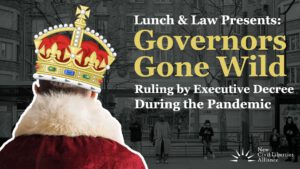
Governors Gone Wild: Ruling by Executive Decree During the Pandemic
NCLA hosted its first virtual Lunch & Law panel.
Our litigation team addressed the cases NCLA has brought—and heart-wrenching stories we have heard—in the past couple of months regarding overreach in the context of the COVID-19 lockdown.
The COVID-19 pandemic has proven to be a threat not only to the health and safety of Americans, but also to our way of life. Under the aegis of public safety, federal, state and local governments have violated constitutional law by implementing regulations and emergency orders by executive decree. As elected leaders and bureaucrats have taken turns trampling civil rights under foot, NCLA has been working overtime to restore the constitutional guardrails on the Administrative State’s pandemic response.
Moderated by: Mark Chenoweth, NCLA Executive Director and General Counsel
Featured Cases and Speakers:
Dawn Desrosiers et al. v. Gov. Charlie Baker [MA]
- NCLA Senior Litigation Counsel Michael DeGrandis and Litigation Counsel Jessica Thompson
Matthew Johnson v. Gov. Philip Murphy [NJ]
- NCLA Staff Counsel Jared McClain and Litigation Counsel Kara Rollins
Carmen’s Corner Store v. Small Business Administration [US]
- NCLA Senior Litigation Counsel John Vecchione and Staff Counsel Jared McClain
Elkhorn Baptist Church v. Gov. Katherine Brown [OR]
- NCLA Senior Litigation Counsel Rich Samp
Comments on Lab Developed Testing Regulations at FDA
- NCLA Senior Litigation Counsel Rich Samp
Letter to the Daytona Florida Police Dept. for unlawfully using ‘pandemic drones’
- NCLA Litigation Counsel Caleb Kruckenberg
March 2020
Events for March 11 2020
1 Event Found
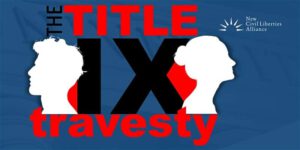
The Title IX Travesty
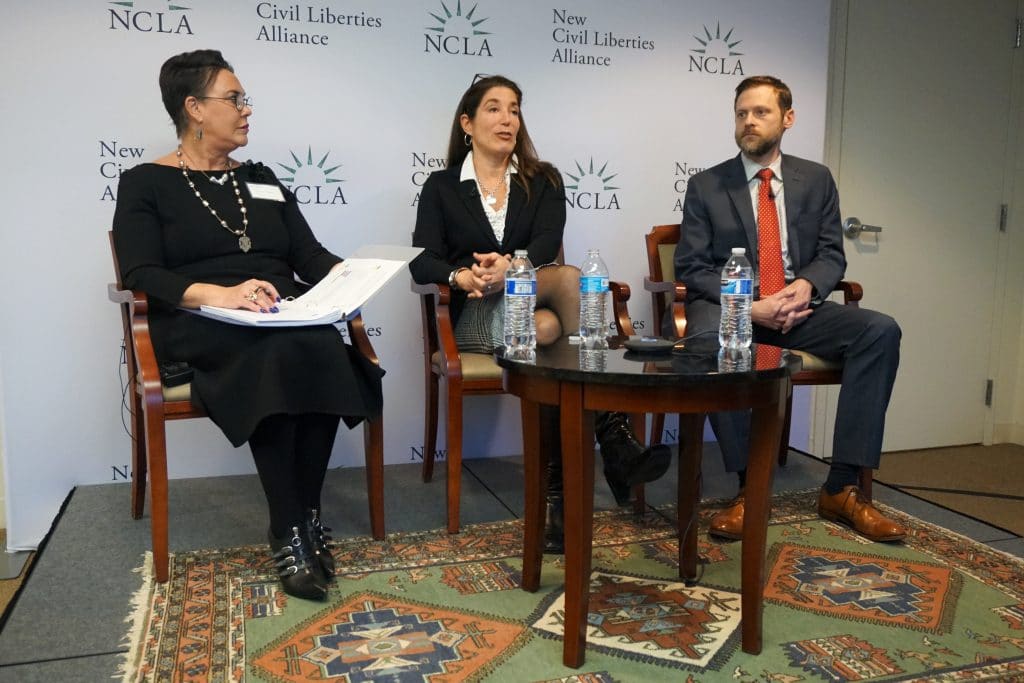
NCLA Senior Litigation Counsel Harriet Hageman hosts Lunch & Law with Jennifer Braceras, the Director of the Independent Women’s Forum Law Center, Hanna Stotland, an admissions consultant, and Caleb Kruckenberg, NCLA Litigation Counsel who is handling Vengalattore v. Cornell University and the U.S. Department of Education.
The panelists are at the forefront of responding to and defending against Title IX complaints at universities. They address the problems associated with university-led investigations of alleged sexual misconduct, including the serious lack of due process that has been so often ignored.
February 2020
Events for January 26 2020
1 Event Found
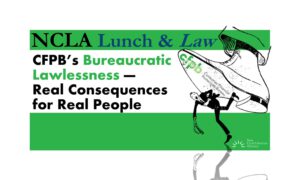
CFPB’s Bureaucratic Lawlessness—Real Consequences for Real People
NCLA Senior Litigation Counsel Michael P. DeGrandis hosts Lunch & Law with Crystal Moroney and attorney Ron Canter to discuss a shocking abuse of process perpetrated by the Consumer Financial Protection Bureau.
To date, Ms. Moroney is nearing the fourth year of a CFPB investigation into her small law firm—an investigation that has included demands for attorney-client privileged documents, multiple Civil Investigative Demands (CIDs) for the same information, and intimidation of her clients. Mr. Canter has been battling CFPB on Ms. Moroney’s behalf from the beginning, and he was ready to defend her in federal court in November 2019. He never got the chance. CFPB had the court dismiss the case as “moot,” but three hours later it announced that it would reissue a nearly identical CID and keep the investigation going without court oversight.
NCLA contends that CFPB acted beyond its constitutional authority when it targeted Ms. Maroney’s Law Firm with a Civil Investigative Demand, withdrew that CID on the cusp of her federal court hearing challenging it, and then promptly issued a new CID practically identical to the original one as soon as the case was dismissed as moot. The complaint asks the Court to redress this fundamental denial of Crystal Moroney’s right to due process.
Last December, The New Civil Liberties Alliance has filed a lawsuit in the U.S. District Court for the Southern District of New York challenging the funding mechanism for the Consumer Financial Protection Bureau (CFPB) as unconstitutional. Specifically, NCLA alleges that Congress unlawfully divested its legislative appropriations power when it gave CFPB the ability to draw funding directly from the Federal Reserve, without annual appropriations from Congress and without oversight from the appropriations committees of Congress.
The case also preserves the objection that Congress may not vest executive authority in CFPB, an independent agency led by a single director, while also shielding that agency’s director from Presidential oversight and removal.
Mark Chenoweth, NCLA Executive Director and General Counsel, believes that, “the case will afford an excellent opportunity to call into question the highly irregular—and almost certainly unconstitutional—way in which Congress has funded CFPB.”
Events for February 26 2020
1 Event Found

CFPB’s Bureaucratic Lawlessness—Real Consequences for Real People
NCLA Senior Litigation Counsel Michael P. DeGrandis hosts Lunch & Law with Crystal Moroney and attorney Ron Canter to discuss a shocking abuse of process perpetrated by the Consumer Financial Protection Bureau.
To date, Ms. Moroney is nearing the fourth year of a CFPB investigation into her small law firm—an investigation that has included demands for attorney-client privileged documents, multiple Civil Investigative Demands (CIDs) for the same information, and intimidation of her clients. Mr. Canter has been battling CFPB on Ms. Moroney’s behalf from the beginning, and he was ready to defend her in federal court in November 2019. He never got the chance. CFPB had the court dismiss the case as “moot,” but three hours later it announced that it would reissue a nearly identical CID and keep the investigation going without court oversight.
NCLA contends that CFPB acted beyond its constitutional authority when it targeted Ms. Maroney’s Law Firm with a Civil Investigative Demand, withdrew that CID on the cusp of her federal court hearing challenging it, and then promptly issued a new CID practically identical to the original one as soon as the case was dismissed as moot. The complaint asks the Court to redress this fundamental denial of Crystal Moroney’s right to due process.
Last December, The New Civil Liberties Alliance has filed a lawsuit in the U.S. District Court for the Southern District of New York challenging the funding mechanism for the Consumer Financial Protection Bureau (CFPB) as unconstitutional. Specifically, NCLA alleges that Congress unlawfully divested its legislative appropriations power when it gave CFPB the ability to draw funding directly from the Federal Reserve, without annual appropriations from Congress and without oversight from the appropriations committees of Congress.
The case also preserves the objection that Congress may not vest executive authority in CFPB, an independent agency led by a single director, while also shielding that agency’s director from Presidential oversight and removal.
Mark Chenoweth, NCLA Executive Director and General Counsel, believes that, “the case will afford an excellent opportunity to call into question the highly irregular—and almost certainly unconstitutional—way in which Congress has funded CFPB.”
November 2019
October 2019
Events for October 10 2019
1 Event Found

The Questionable Future of Brand X Deference Doctrine
NCLA recently filed a Petition for Certiorari in the United States Supreme Court in the case of Baldwin v. United States.
Howard and Karen Baldwin are the producers of the critically acclaimed movie “Ray” (2004) about the life of musician, Ray Charles. They are also law-abiding Americans whose simple act of sending their claim for a tax refund to the Internal Revenue Service by regular U.S. mail has led them all the way to the Supreme Court to get their money back as a result of the Brand X deference.
NCLA Litigation Counsel Adi Dynar moderates a lively discussion with Robert W. Keaster, attorney for Howard and Karen Baldwin, and Robert T. Carney, Tax Litigator and Administrative Tax expert, to learn why this case has implications far beyond the Baldwins getting their refund from the IRS.
July 2019
Events for July 17 2019
1 Event Found
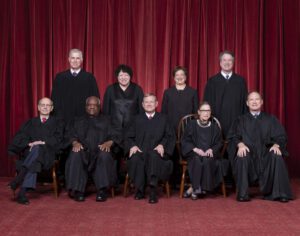
Gundy v. United States: The end of non-delegation or a new beginning?
The Constitution vests Congress—and Congress alone—with the power to make law. However, for decades now, the so-called nondelegation doctrine has been rendered weak and useless by a Court reticent to enforce the Constitution’s separation of powers and the unconstitutional lawmaking authority exercised by executive officers. Panelists David Schoenbrod, a trustee professor at New York Law School, and Mark Chenoweth, Executive Director of NCLA, discuss the Supreme Court decision in Gundy v. United States and its impact on the nondelegation doctrine in this Lunch & Law speaker series moderated by NCLA Senior Litigation Counsel, Steve Simpson.
June 2019
April 2019
Events for April 23 2019
1 Event Found
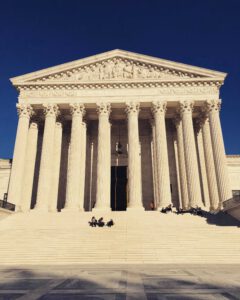
Democracy in Peril: Why Controlling the Administrative State is Essential to Preserving our Constitutional System
There is a revolution in political power and it has its designs on defeating the Constitution. This panel discusses why judicial fortitude, public awareness and a renewed commitment to our form of government is essential to preserving the American form of democracy. Listen to this lively discussion moderated by NCLA Senior Litigation Counsel, Peggy Little.
Panelist, Peter J. Wallison, Author of Judicial Fortitude, The Last Chance to Rein in the Administrative State
Panelist, Christopher DeMuth, Distinguished Fellow at The Hudson Institute
NCLA Moderator, Peggy Little, Senior Litigation Counsel for NCLA
March 2019
Events for February 28 2019
1 Event Found
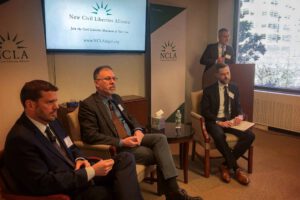
The Bump Stock Ban: Administrative Overreach or Valid Measure?
The Bureau of Alcohol, Tobacco, Firearms and Explosives (ATF) issued a rule banning bump stock devices effective March 26, 2019. In response, the New Civil Liberties Alliance filed a complaint with the U.S. District Court in the District of Utah against the bump stock ban. NCLA has not taken a position on bump stocks, but we do believe that Congress, not government agencies should write statutes.
But there are voices in this debate who stand by the order. Join NCLA and a distinguished panel of attorneys on both sides of the argument in a lively discussion moderated by NCLA litigation counsel, Caleb Kruckenberg, regarding the legal legitimacy of the ATF’s actions.
Panelist, Erik S. Jaffe, Attorney for Damien Guedes, Shane Roden, Firearms Policy Foundation, Madison Society Foundation, Inc., and Florida Carry, Inc., in Guedes et al. v. ATF, D.C. Cir. No. 19-5042.
Panelist, Adam Skaggs, Chief Counsel, Giffords Law Center, Amicus Curiae in support of the final rule in Guedes et al. v. ATF, D.C. Cir. No. 19-5042.
NCLA Moderator, Caleb Kruckenberg, Litigation Counsel for NCLA, in Aposhian v. Barr, et al., 19-cv-00037-JNP
Events for March 28 2019
1 Event Found

The Bump Stock Ban: Administrative Overreach or Valid Measure?
The Bureau of Alcohol, Tobacco, Firearms and Explosives (ATF) issued a rule banning bump stock devices effective March 26, 2019. In response, the New Civil Liberties Alliance filed a complaint with the U.S. District Court in the District of Utah against the bump stock ban. NCLA has not taken a position on bump stocks, but we do believe that Congress, not government agencies should write statutes.
But there are voices in this debate who stand by the order. Join NCLA and a distinguished panel of attorneys on both sides of the argument in a lively discussion moderated by NCLA litigation counsel, Caleb Kruckenberg, regarding the legal legitimacy of the ATF’s actions.
Panelist, Erik S. Jaffe, Attorney for Damien Guedes, Shane Roden, Firearms Policy Foundation, Madison Society Foundation, Inc., and Florida Carry, Inc., in Guedes et al. v. ATF, D.C. Cir. No. 19-5042.
Panelist, Adam Skaggs, Chief Counsel, Giffords Law Center, Amicus Curiae in support of the final rule in Guedes et al. v. ATF, D.C. Cir. No. 19-5042.
NCLA Moderator, Caleb Kruckenberg, Litigation Counsel for NCLA, in Aposhian v. Barr, et al., 19-cv-00037-JNP
February 2019
Events for January 28 2019
1 Event Found
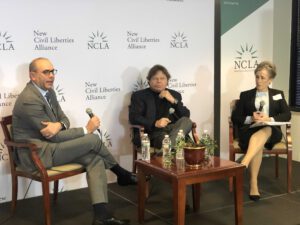
NCLA Timbervest v. SEC Lunch & Law
The former principals of Timbervest, LLC join NCLA’s Lunch & Law speaker series in a candid chat about the company’s hard-fought six-year battle against the SEC’s enforcement division. Distinguished Panelists: Joel Shapiro, Former Timbervest, LLC Principal George Kostolampros, Venable, LLP Moderated by NCLA Senior Litigation Counsel, Peggy Little.
Events for February 28 2019
1 Event Found

NCLA Timbervest v. SEC Lunch & Law
The former principals of Timbervest, LLC join NCLA’s Lunch & Law speaker series in a candid chat about the company’s hard-fought six-year battle against the SEC’s enforcement division. Distinguished Panelists: Joel Shapiro, Former Timbervest, LLC Principal George Kostolampros, Venable, LLP Moderated by NCLA Senior Litigation Counsel, Peggy Little.
DOT Backs Down After NCLA Sues Over Unfair In-House Tribunals
NCLA successfully challenged the Department of Transportation’s unlawful and unconstitutional in-house tribunals. DOT subjected NCLA’s client, Polyweave Packaging Inc., to a six-year prosecution in one such tribunal for violating a law that does not exist. The prosecution flunked the most basic standards for fairness and impartiality because employees who shared an office acted as both prosecutor and judge.
NCLA President and General Counsel Mark Chenoweth moderates a panel discussion with: Sheng Li, NCLA Litigation Counsel, who leads Polyweave’s lawsuits against DOT; Neil Werthmann, Polyweave’s Owner and President; and Jerry Cox, who has represented countless clients in DOT’s abusive administrative proceedings.
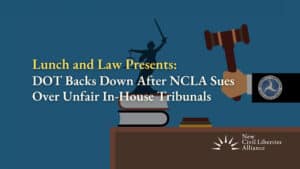
DOT Backs Down After NCLA Sues Over Unfair In-House Tribunals
NCLA successfully challenged the Department of Transportation’s unlawful and unconstitutional in-house tribunals. DOT subjected NCLA’s client, Polyweave Packaging Inc., to a six-year prosecution in one such tribunal for violating a law that does not exist. The prosecution flunked the most basic standards for fairness and impartiality because employees who shared an office acted as both prosecutor and judge.
NCLA President and General Counsel Mark Chenoweth moderates a panel discussion with: Sheng Li, NCLA Litigation Counsel, who leads Polyweave’s lawsuits against DOT; Neil Werthmann, Polyweave’s Owner and President; and Jerry Cox, who has represented countless clients in DOT’s abusive administrative proceedings.
SCOTUS Confirms Right to Challenge Agencies in Court
Focus Area:
Due Process Violations
The due process of law guarantees a right to be held to account only through the processes of an impartial court—something administrative tribunals violate every day.
After seven years of an uphill battle challenging the adjudicatory process at the Securities and Exchange Commission, Michelle Cochran’s backbreaking journey has paid off. In a historic and unanimous Supreme Court victory in Axon v. FTC consolidated with SEC v. Cochran, the highest court in the land declared earlier this month that Michelle can, indeed, challenge the constitutionality of the agency’s adjudicatory process (and even the constitutionality of the agency itself) before undergoing yet another administrative adjudication.
As Justice Gorsuch remarked after describing the long and painful path taken by NCLA’s client to get to this point: “This is what a win looks like.” But now what
NCLA President and General Counsel Mark Chenoweth moderates a discussion with our expert panelists: Greg Garre, partner at Latham & Watkins, and Peggy Little, Senior Litigation Counsel at NCLA, to answer that very question.

SCOTUS Confirms Right to Challenge Agencies in Court
After seven years of an uphill battle challenging the adjudicatory process at the Securities and Exchange Commission, Michelle Cochran’s backbreaking journey has paid off. In a historic and unanimous Supreme Court victory in Axon v. FTC consolidated with SEC v. Cochran, the highest court in the land declared earlier this month that Michelle can, indeed, challenge the constitutionality of the agency’s adjudicatory process (and even the constitutionality of the agency itself) before undergoing yet another administrative adjudication.
As Justice Gorsuch remarked after describing the long and painful path taken by NCLA’s client to get to this point: “This is what a win looks like.” But now what
NCLA President and General Counsel Mark Chenoweth moderates a discussion with our expert panelists: Greg Garre, partner at Latham & Watkins, and Peggy Little, Senior Litigation Counsel at NCLA, to answer that very question.
The Surveillance State Suffers Defeat
Just because you work in a regulated industry doesn’t mean the government can watch you all the time. NCLA successfully challenged an unlawful and unconstitutional regulation by the National Marine Fisheries Service (NMFS), which required 24-hour GPS tracking of recreational charter boat fishing vessels and reporting of confidential economic data.
Essentially, this federal agency was forcing all charter boat captains to wear ankle monitors like convicted criminals, despite not having done anything wrong! Thankfully, the Fifth Circuit Court of Appeals ruled that NMFS violated the Administrative Procedure Act and, likely, the Fourth Amendment. But is the case over? Will NMFS simply reissue a substantively similar surveillance rule? How can we stop the federal government from spying on us with a massive regime of suspicion-less administrative search?
NCLA Senior Litigation Counsel John Vecchione moderates a panel discussion with Greg Grimsal, member of GAMB (Gordon Arata Montgomery Barnett), and Robert Alt, President and CEO of The Buckeye Institute, who submitted an amicus brief in support of the successful challenge.

The Surveillance State Suffers Defeat
Just because you work in a regulated industry doesn’t mean the government can watch you all the time. NCLA successfully challenged an unlawful and unconstitutional regulation by the National Marine Fisheries Service (NMFS), which required 24-hour GPS tracking of recreational charter boat fishing vessels and reporting of confidential economic data.
Essentially, this federal agency was forcing all charter boat captains to wear ankle monitors like convicted criminals, despite not having done anything wrong! Thankfully, the Fifth Circuit Court of Appeals ruled that NMFS violated the Administrative Procedure Act and, likely, the Fourth Amendment. But is the case over? Will NMFS simply reissue a substantively similar surveillance rule? How can we stop the federal government from spying on us with a massive regime of suspicion-less administrative search?
NCLA Senior Litigation Counsel John Vecchione moderates a panel discussion with Greg Grimsal, member of GAMB (Gordon Arata Montgomery Barnett), and Robert Alt, President and CEO of The Buckeye Institute, who submitted an amicus brief in support of the successful challenge.
Unforgivable Student Loan Forgiveness
Focus Area:
Scope of Authority / Nondelegation
The structure of the Constitution allows only Congress to legislate, only the Executive to enforce laws, and only the Judiciary to decide cases. But the Administrative State evades the Constitution’s avenues of governance when executive agencies issue regulations without statutory authorization from Congress.
The President does not have the legal authority to forgive student loans on his own. Only Congress can enact laws authorizing debt-forgiveness programs. And only Congress has the power of the purse to pay for debt forgiveness. That is why NCLA has filed a lawsuit on behalf of its client, Cato Institute, urging the U.S. District Court for the District of Kansas to stop the Department of Education (ED)’s student-loan-debt-cancellation plan.
Two related lawsuits against the half-trillion-dollar loan cancellation plan, Biden v. Nebraska and Dept. of Education v. Brown, have made it to the Supreme Court and will be argued on February 28, 2023. NCLA and Cato have both filed separate amicus briefs arguing the program is both unlawful and unfair. This cancellation plan, however, is merely the most prominent part of ED’s recent unconstitutional attempts at student-loan-debt-cancellation.
Since October 2020, ED has paused monthly payments and interest accrual for all student-loan borrowers, regardless of their economic situation. The forgone interest alone has cost taxpayers over $100 billion, and in January, ED announced yet a new plan to transform income-driven repayment plans into grants, which will cost another half-trillion dollars over the next decade. Like the loan-cancellation plan being argued in the Supreme Court, both the ongoing pause and the repayment proposal are unconstitutional agency actions that fail to address the unsustainable cost of higher education.
Join us March 1, 2023 as NCLA Senior Litigation Counsel Russ Ryan moderates a discussion on this thorny issue with NCLA Litigation Counsel Sheng Li and Neal McClusky, Director of the Center for Educational Freedom at the Cato Institute.
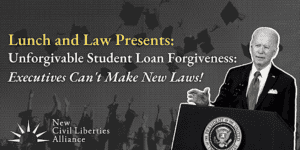
Unforgivable Student Loan Forgiveness
The President does not have the legal authority to forgive student loans on his own. Only Congress can enact laws authorizing debt-forgiveness programs. And only Congress has the power of the purse to pay for debt forgiveness. That is why NCLA has filed a lawsuit on behalf of its client, Cato Institute, urging the U.S. District Court for the District of Kansas to stop the Department of Education (ED)’s student-loan-debt-cancellation plan.
Two related lawsuits against the half-trillion-dollar loan cancellation plan, Biden v. Nebraska and Dept. of Education v. Brown, have made it to the Supreme Court and will be argued on February 28, 2023. NCLA and Cato have both filed separate amicus briefs arguing the program is both unlawful and unfair. This cancellation plan, however, is merely the most prominent part of ED’s recent unconstitutional attempts at student-loan-debt-cancellation.
Since October 2020, ED has paused monthly payments and interest accrual for all student-loan borrowers, regardless of their economic situation. The forgone interest alone has cost taxpayers over $100 billion, and in January, ED announced yet a new plan to transform income-driven repayment plans into grants, which will cost another half-trillion dollars over the next decade. Like the loan-cancellation plan being argued in the Supreme Court, both the ongoing pause and the repayment proposal are unconstitutional agency actions that fail to address the unsustainable cost of higher education.
Join us March 1, 2023 as NCLA Senior Litigation Counsel Russ Ryan moderates a discussion on this thorny issue with NCLA Litigation Counsel Sheng Li and Neal McClusky, Director of the Center for Educational Freedom at the Cato Institute.
'Peekaboo' Prosecutions: How a Private Corporation Is Acting as a Govt-Backed Star Chamber
Focus Area:
Due Process Violations
The due process of law guarantees a right to be held to account only through the processes of an impartial court—something administrative tribunals violate every day.
Scope of Authority / Nondelegation
The structure of the Constitution allows only Congress to legislate, only the Executive to enforce laws, and only the Judiciary to decide cases. But the Administrative State evades the Constitution’s avenues of governance when executive agencies issue regulations without statutory authorization from Congress.
Imagine a world where Congress empowers a private corporation to secretly investigate and punish members of a particular industry. Enter the Public Company Accounting Oversight Board (PCAOB) — often derided as “peekaboo” due to its acronym and infamous secrecy. This private version of the Securities and Exchange Commission receives funding that never requires an appropriation from Congress and employs personnel who are exempt from laws designed to keep regulators in check.
This private regulator’s activity is secretly performed by staff employees with no meaningful supervision by any president-appointed government official. There is no jury and no multi-member hearing panel that includes your industry peers.
NCLA Senior Litigation Associate Russ Ryan will moderate a panel of distinguished experts to discuss the myriad problems posed by such an obviously unconstitutional private enforcement mechanism, as well as what must be done to restore our fundamental civil liberties.
About our Panel
Mike Carvin, a partner at Jones Day, is one of the leading appellate and trial lawyers challenging state and federal regulations on constitutional and statutory grounds, with 11 Supreme Court arguments and numerous high-profile victories, including Free Enterprise Fund v. PCAOB, in which the Supreme Court that held the PCAOB unconstitutional on account of the board members being improperly insulated from Presidential removal authority.
Andrew Vollmer, a senior affiliated scholar at the Mercatus Center, was the deputy general counsel at the Securities and Exchange Commission from 2006 to early 2009 as well as serving for many years as a partner in the securities litigation and enforcement practice of Wilmer Cutler Pickering Hale and Dorr LLP.

'Peekaboo' Prosecutions: How a Private Corporation Is Acting as a Govt-Backed Star Chamber
Imagine a world where Congress empowers a private corporation to secretly investigate and punish members of a particular industry. Enter the Public Company Accounting Oversight Board (PCAOB) — often derided as “peekaboo” due to its acronym and infamous secrecy. This private version of the Securities and Exchange Commission receives funding that never requires an appropriation from Congress and employs personnel who are exempt from laws designed to keep regulators in check.
This private regulator’s activity is secretly performed by staff employees with no meaningful supervision by any president-appointed government official. There is no jury and no multi-member hearing panel that includes your industry peers.
NCLA Senior Litigation Associate Russ Ryan will moderate a panel of distinguished experts to discuss the myriad problems posed by such an obviously unconstitutional private enforcement mechanism, as well as what must be done to restore our fundamental civil liberties.
About our Panel
Mike Carvin, a partner at Jones Day, is one of the leading appellate and trial lawyers challenging state and federal regulations on constitutional and statutory grounds, with 11 Supreme Court arguments and numerous high-profile victories, including Free Enterprise Fund v. PCAOB, in which the Supreme Court that held the PCAOB unconstitutional on account of the board members being improperly insulated from Presidential removal authority.
Andrew Vollmer, a senior affiliated scholar at the Mercatus Center, was the deputy general counsel at the Securities and Exchange Commission from 2006 to early 2009 as well as serving for many years as a partner in the securities litigation and enforcement practice of Wilmer Cutler Pickering Hale and Dorr LLP.
How the SEC and FTC Stack the Deck in Their Favor with ALJs
Focus Area:
Due Process Violations
The due process of law guarantees a right to be held to account only through the processes of an impartial court—something administrative tribunals violate every day.
Agencies wield tremendous power over almost all aspects of American life, enacting thousands of regulations every year that have the force of law. Many agencies, like the Securities and Exchange Commission (SEC) and the Federal Trade Commission (FTC), use agency employees with the title of “administrative law judge” (ALJ) to enforce this staggering edifice of agency-made rules. These are not impartial Article III judges, but agency enforcers with an intractable bias in favor of their employer.
Under these circumstances, the process is the punishment. Agency enforcement can be brutal, often destroying the lives, reputations, and businesses of enforcement targets long before any wrongdoing is ever established. Further, in-house adjudication—where your judge’s boss is also your prosecutor—confers an staggering homecourt advantage for agencies (90% for SEC and 100% for FTC).
In 2016-17, Michelle Cochran endured one such administrative trial and was facing a second still-unconstitutional proceeding after the Supreme Court ruled in 2018 that the first judge had not been constitutionally appointed. Her suit in federal court—and a later suit by Axon—raised the question: Who decides constitutional questions?
Should it be unaccountable ALJs insulated from removal whose very competence to adjudicate is at issue, or Senate-confirmed Article III judges making an unbiased review of the constitutionality of the proceeding before it takes place?
For years, Michelle Cochran and Axon Enterprise Inc. fought to have that question answered all the way to the United States Supreme Court.
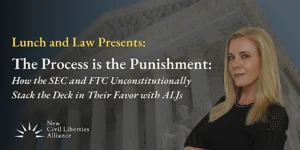
How the SEC and FTC Stack the Deck in Their Favor with ALJs
Agencies wield tremendous power over almost all aspects of American life, enacting thousands of regulations every year that have the force of law. Many agencies, like the Securities and Exchange Commission (SEC) and the Federal Trade Commission (FTC), use agency employees with the title of “administrative law judge” (ALJ) to enforce this staggering edifice of agency-made rules. These are not impartial Article III judges, but agency enforcers with an intractable bias in favor of their employer.
Under these circumstances, the process is the punishment. Agency enforcement can be brutal, often destroying the lives, reputations, and businesses of enforcement targets long before any wrongdoing is ever established. Further, in-house adjudication—where your judge’s boss is also your prosecutor—confers an staggering homecourt advantage for agencies (90% for SEC and 100% for FTC).
In 2016-17, Michelle Cochran endured one such administrative trial and was facing a second still-unconstitutional proceeding after the Supreme Court ruled in 2018 that the first judge had not been constitutionally appointed. Her suit in federal court—and a later suit by Axon—raised the question: Who decides constitutional questions?
Should it be unaccountable ALJs insulated from removal whose very competence to adjudicate is at issue, or Senate-confirmed Article III judges making an unbiased review of the constitutionality of the proceeding before it takes place?
For years, Michelle Cochran and Axon Enterprise Inc. fought to have that question answered all the way to the United States Supreme Court.
